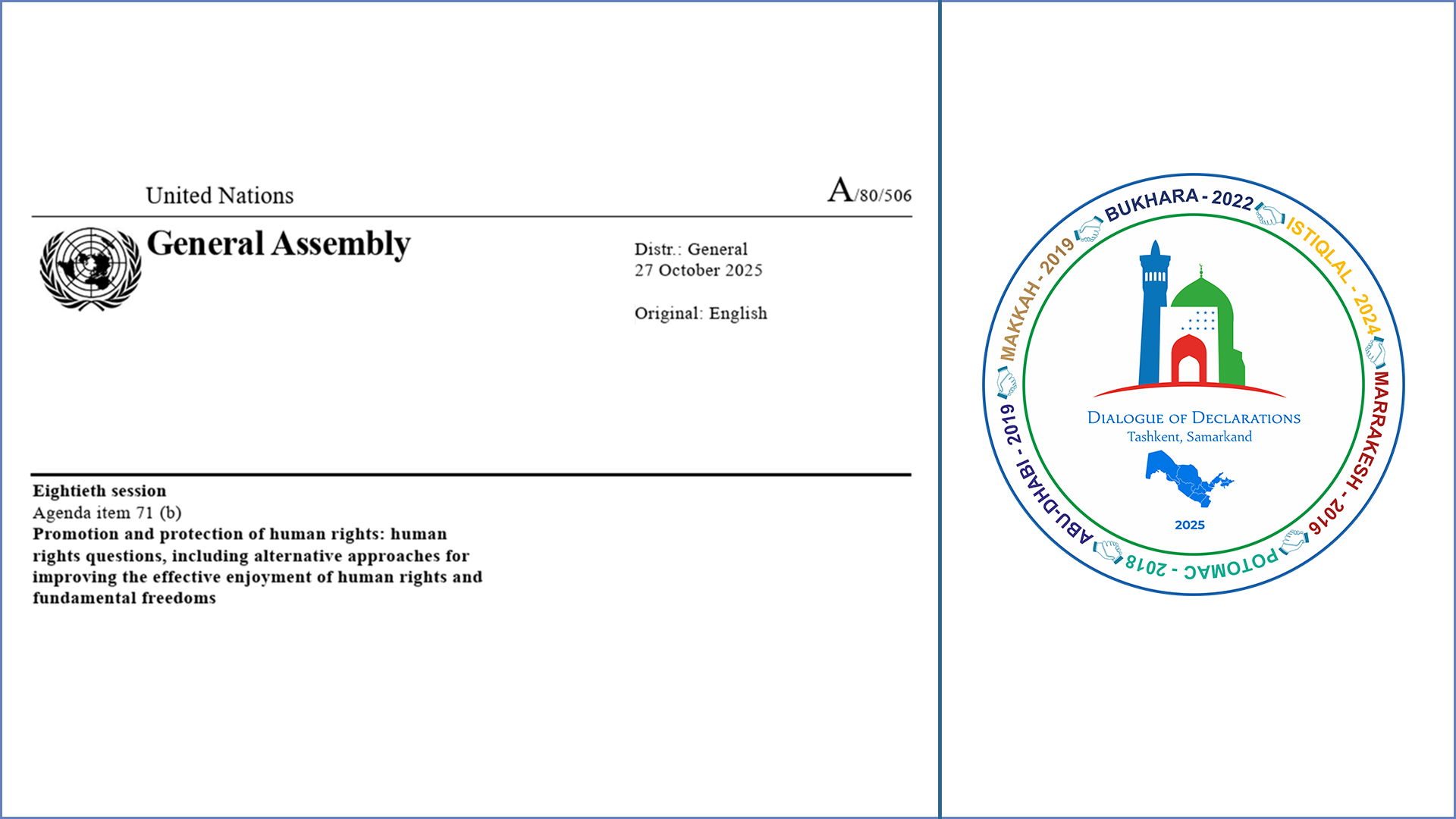At the 80th session of the UN General Assembly, the address of the participants of the II International Forum “Dialogue of Declarations,” held from 10 to 13 September 2025 in Tashkent and Samarkand, was adopted as an official document.
At the 80th session of the UN General Assembly, the address of the participants of the II International Forum “Dialogue of Declarations,” held from 10 to 13 September 2025 in Tashkent and Samarkand, was adopted as an official document.

APPEAL by the Participants of the Second International Forum “Dialogue of Declarations”
We, the participants of the Second International Forum “Dialogue of Declarations”, affirm that the event held in Tashkent has served as a vital platform for addressing pressing issues related to the protection of freedom of religion or belief, the strengthening of interreligious and intercultural dialogue, the prevention of religious intolerance and discrimination, and the curbing of violent extremism.
We acknowledge the constructive role of Uzbekistan, which continues to pursue a consistent policy aimed at safeguarding freedom of conscience and religion. The country’s positive initiatives – including the improvement of legislation, the promotion of dialogue between the state and religious organizations, the advancement of education, and the enhancement of religious literacy – merit recognition at the international level.
We, the Forum participants, further assert that in the context of global instability, the rise of extremism, and the intensification of religious intolerance worldwide, the protection of freedom of religion or belief, along with the promotion of tolerance and interfaith dialogue, must become an integral part of the international human rights agenda.
In this regard, we once again call upon the governments of all nations to give due attention to the implementation of the core provisions of previously adopted international instruments that uphold the principles of religious freedom and equality of rights. In this context, we highlight the significant role of:
The Marrakesh Declaration (2016), which affirms the necessity of protecting the rights of religious minorities;
The Jakarta Declaration (2017), which emphasizes the priority of fostering social harmony through enhanced interreligious dialogue;
The Potomac Declaration (2018), which proclaims the principle of global solidarity in matters of religious freedom;
The Punta del Este Declaration (2018), which advocates for the strict observance of human rights.
We further underscore the significance of the Mecca Declaration (2019), which affirms the vital importance of the principles of moderation and peaceful coexistence.
In this context, we place special emphasis on the pivotal role of the Bukhara Declaration, adopted in the ancient city of Bukhara following the previous Forum held in 2022. The Bukhara Declaration promotes the ideals of intercivilizational dialogue, mutual respect, and tolerance. It calls for enhanced cooperation among states, religious organizations, and civil society to prevent conflicts rooted in religious and ethnocultural differences, to foster a culture of peace, and to ensure equal rights and opportunities for all religious and ethnic groups.
The importance of the Bukhara Declaration was reaffirmed by its designation as an official document of the 76th session of the United Nations General Assembly.
The Parliament of the Republic of Uzbekistan – comprising the Legislative Chamber and the Senate of the Oliy Majlis – has also expressed formal support for the principles and positions enshrined in the Bukhara Declaration, confirming the country’s commitment to the ideals of intercivilizational dialogue, tolerance, respect for cultural and religious diversity, and its readiness to promote these values at both the national and international levels.
We further affirm that the effective implementation of the core principles of all adopted declarations, and the proper safeguarding of human rights and freedoms, requires a comprehensive approach—legal, educational, cultural, and scientific—aimed at cultivating a sustainable atmosphere of respect, generosity, and mutual trust.
In this regard, we, the Forum participants:
Emphasize the importance of implementing declarative instruments as expressions of national and international priorities, serving as guiding frameworks for the advancement of human rights, sustainable development, a culture of peace, and global justice.
We note that dialogue among various declarations enables the practical identification of common ground between differing value systems, approaches, and legal traditions;
Draw attention to the foundational significance of Article 18 of the Universal Declaration of Human Rights, which enshrines the right of every individual to freedom of thought, conscience, and religion.
We reaffirm the principle that “the exercise of these freedoms may be subject only to such limitations as are prescribed by law and are necessary to protect public safety, order, health, morals, or the fundamental rights and freedoms of others – in accordance with international human rights standards”;
Stress the need for consolidated efforts by states, international organizations, the academic community, religious leaders, and civil society institutions to promote freedom of religion or belief. We believe that a key element in this process is the development and implementation of national and international strategies aimed at protecting the rights of believers, preventing religious discrimination, and ensuring the equal participation of religious communities in public and cultural life;
Highlight the importance of inclusive initiatives that ensure active engagement of youth, women, and representatives of diverse ethnic and religious groups in building sustainable interfaith cooperation and countering radicalization;
Call upon the international community, regional organizations, and national governments to strengthen partnerships, exchange best practices, and jointly implement initiatives aimed at promoting religious tolerance, intercultural dialogue, and interfaith harmony.
The Forum concludes its work with a firm conviction in the necessity of continuing international dialogue based on mutual respect, solidarity, and a shared commitment to ensuring freedom of religion or belief as one of the fundamental human rights.
Tashkent, Republic of Uzbekistan 13 September 2025
Previous

On November 17 of this year, during the state visit of the President of Turkmenistan Serdar Berdimuhamedov to Uzbekistan, in the presence of the heads of the two states, a Memorandum on the establishment of an Uzbek-Turkmen expert council was exchanged between the Institute for Strategic and...
17.11.2025





